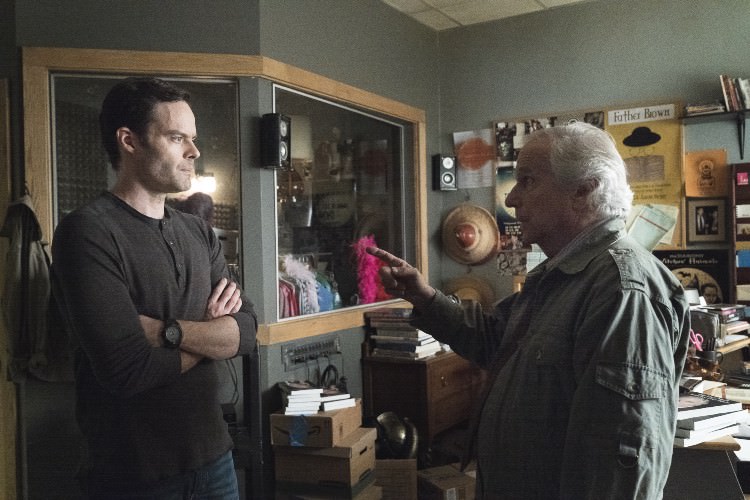 |
| Photo: Isabella Vosmikova/HBO |
In its second season, Barry is seems intent on forcing its characters to face the harsh truth about themselves. "The Power of No" follows through on the premiere's promise, as several characters get their bubbles burst.
"Am I evil?" Barry asks Noho Hank, as the two stake out the monastery that houses Esther and the rest of the Burmese crime gang. "Of course," he chirps back, before asking Barry to do a classic Noho Hank favor by using the bullet the Chechens sent him as a warning to kill Esther (and to dig it out of her head so he can send back the bloody souvenir of course). While it's easy for Barry to brush off Hank, shaking off doubts about his morality is harder to do elsewhere. Inspired by his confession about his war experience, the rest of the acting class is engaging in what Sally correctly deems "competitive grief," and the results are as unintentionally hilarious and self-indulgent as you'd expect.
Barry's semi-honest reveal has brought a new conundrum at his doorstep. On the one hand, Gene and his classmates expect him to offer up more gruesome details about his military service. But what goes unsaid is those stories are to be told in the way where Barry is a reluctant, guilt-ridden mercenary, an otherwise good man who was forced to kill and is now haunted by his actions. The actual story--that discovering he was good shot was a highlight of what had up to that point been an unremarkable life--is too messy and uncomfortable.
Even worse, Gene has the bright idea to have everyone write their own pieces about defining moments in their lives. Barry initially manages to dodge the assignment by making his piece all about how he met Gene. However, Gene changes his mind after a painful conversation with his estranged son Leo. Gene goes on and on about repairing their relationship, blaming his students as the reason he walked out on the family. Leo, without a hint of malice, points out the obvious: the whole gesture, as with his acting class, is all about feeding his own ego. Hearing this, and seeing his egomania depicted via a script reading between Barry and Antonio, deflates him enough that he forces Barry to write about his time in Afghanistan.
Sally, now signed to an agency, has little time Gene's new exercise, or so she thinks. Judging from a reel that includes bit parts as a suburban damsel in distress, a secretary and an alien, she's far from A-list status. While her male agents are oblivious to her unease, their coworker Lindsay knows what's up and advises her to play the game--which in this case means continue to take shit parts until a star-making role comes along. Like Gene, Sally is content to coast on the surface emotionally, convinced her defining story is her struggle to reach beyond terrible bit parts. After Gene pulls his patented stone face routine though, she stumbles onto her own painful backstory, that of a woman who left an abusive marriage and rebuilt her life, one with a burgeoning (to put it kindly, no shade) career and a man who wouldn't hurt a fly.
Of course, we know the opposite is true of Barry, as the camera quickly cuts to him putting a silencer on his gun before sneaking into the monastery to take out Esther. Unfortunately, Sally's words come to mind at the worst possible moment, causing Barry to falter and walk into a room full of Burmese gang members. Next thing you know they're all pissed off, shooting at his car as he barely escapes.
Fuches is back in the picture as well, paying Barry a visit after being tracked down by Detective Loach. In case you forgot, Fuches is all about Fuches, and is working with the cops to trap Barry into confessing to Janice's murder. Barry's too smart and wary to blurt out "yea I killed a cop," but never underestimate Fuches' powers of emotional manipulation. His former mentor represents another person seeking to confine Barry to his past, one that he's still struggling to escape.
Comments